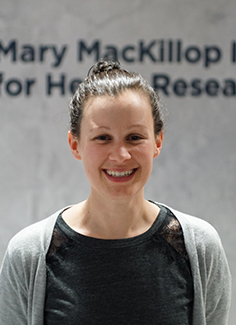Lifestyle
Copyright@ Australian Catholic University 1998-2026 | ABN 15 050 192 660 CRICOS registered provider: 00004G | PRV12008
Copyright@ Australian Catholic University 1998-2026 | ABN 15 050 192 660 CRICOS registered provider: 00004G | PRV12008

They say that timing is everything, and when it comes to eating, the saying might ring true. Groundbreaking research into ‘time-restricted eating’ suggests the time we eat may be the secret ingredient to staying slim and healthy.
So, you hate dieting. Counting calories or cutting carbs or eating only what the cavemen ate just doesn’t cut it.
The good news is there may be a new way of keeping your waistline in check without overhauling your diet.
It’s called time-restricted eating, and it involves only consuming food or drink within a specific time-window of around 10 hours during the day.
That means that if your personal restaurant puts up the “open” sign for breakfast at 9 am, you’ll eat your last mouthful of dinner and flip it back to “closed” by 7pm that evening, giving your body a chance to recuperate and move into fasting mode.
The study of time-restricted eating (TRE) in humans is fresher than a homegrown tomato, and so researchers are cautious about making grand statements. But it’s already been described as the “diet buzzword of 2019”, and early studies indicate that not only can it help with weight loss, it can also reduce the risk of chronic disease and lead to improved sleep and increased energy levels.
Dr Evelyn Parr, post-doctoral research fellow at ACU’s Mary MacKillop Institute for Health Research, is one of a handful of experts worldwide exploring TRE. She has spent the last year studying how it can influence our weight and wellbeing, including its potential effect on blood glucose regulation, crucial for those with type 2 diabetes.
Our bodies are programmed to run on internal clocks that tell us the best time to eat, sleep and be active, says Dr Parr. Recent research has shown that disruptions to this daily rhythm can lead to weight gain, fatigue and other ailments.
“Food is available to us all the time, and people don't like feeling hungry, so we spend a lot of our time snacking and grabbing something from the fridge without thinking about what time it is and what consequences that might have,” she said.
“When we eat at ‘inappropriate’ times, it affects our response to the hormones our body releases … For example, we naturally release more melatonin at night, which prepares us for sleep, and if you're eating when that melatonin is released, it sends the wrong signal to your body and can cause you to have trouble sleeping.”
In simple terms, we process foods eaten during the day more efficiently than late at night or early in the morning, and it’s believed an extended overnight fasting period can help to keep our body’s timing in check by switching on genes that improve metabolism and combat disease.
There may be another thing at play here. Think about the foods you’re most likely to indulge in while curled under your nanna rug watching The Bachelor. The carrots and celery stay tucked in the veggie drawer, and out comes the wine and salted caramel ice cream.
Human studies into time-restricted eating have found that if you eat your last bite of food earlier in the evening, you’re less likely to indulge in these treats.
“The typical end-of-day foods changed, so that means less alcohol, less foods like ice-cream, chocolate and other sweet treats that people tend to snack on at the end of the day, and that obviously has an effect on total energy intake,” Dr Parr said.
This raises the question: is it the long overnight fast that’s doing the job, or simply that eating an earlier dinner often cuts out high-calorie foods, resulting in a diet by default?

Dr Parr suspects the timing is more important.
“Some people, when you give them that restricted time window, they just squish everything in, so they eat exactly the same amount and the same types of foods, just in a shorter time frame,” she said. “Anecdotally, it seems they’re seeing the same benefits as those who cut out late-night snacks and are therefore consuming less, but we haven't quite nailed it down — there haven't been enough studies in humans to say that conclusively.”
The early data from Dr Parr’s current study, which will involve 24 human participants eating within a nine-hour time window, indicates that people can reap the benefits of TRE without eating less.
Meanwhile, several animal studies into time-restricted eating have also suggested the timing is crucial. A landmark 2012 study found that mice fed a high-fat diet within an eight-hour time window weighed less and were healthier than those who ate whenever they wanted, even when both groups had the same calorie intake.
“The gain of body weight was greater when they ate outside of the time window and their glucose tolerance and insulin sensitivity were reduced — so that would suggest the benefits of time-restricted eating are mostly to do with the timing,” Dr Parr said.
In recent years, fasting diets like 5:2 have grown in popularity, heralded in the media as a simple way to “slim down, stress less and sleep better”.
Most diets, however, don’t succeed in the long term, and while 5:2 may seem easier than others because it only requires energy restriction on five days a week, some research has shown it may also have problems with adherence.
Dr Parr believes the simplicity of time-restricted eating might make it more sustainable. While her current research is studying the effects of eating within a nine-hour period, for many people a 10-hour window would be more realistic.
“I think time-restricted eating has the potential to make a difference to people’s lives, but it has to be feasible,” she said. “People have to be able to adhere to it, otherwise, what's the point?”
Research has shown that most people adhere to TRE on at least five days a week, and in most cases still experience the benefits. One animal study found that rodents who ate within a restricted window for five days a week but had two “cheat days” on the weekend still had positive results.
“Our social lives mean that restaurants are open late on the weekend, and we’re more likely to be out late and spending time with friends, so I think it's important to say that if you do take on time-restricted eating, it doesn't mean you'll never eat late again,” Dr Parr said.
“We're all human; we're real people with real lives, so you've got to stay within reason and find something that will work in the long-term.”
Dr Parr’s current research project is exploring the effect that TRE could have on type 2 diabetes — a disease characterised by excess blood glucose levels.
When we eat in the hours approaching bedtime, our body’s ability to release insulin is dampened, making it harder to regulate blood glucose levels. Dr Parr is hopeful that TRE will make it easier for people living with diabetes to control their blood glucose without needing to closely monitor their diet.

One of the seven participants who have already completed the study is Lawrence Byrne, 62, who shed 1.5 kilograms during the initial four-week period and lost a further three kilos after the study. Perhaps more impressively, he dropped his waist circumference by more than 10 centimetres and reduced his central visceral fat.
“Before I started this, I’d go out to dinner every night at 9pm and would sometimes still be eating after midnight,” he said. “I’ve done that for years, but I understand that’s not a clever way to treat your body.”
Since starting TRE, Mr Byrne has found he has more energy during the day and sleeps more soundly at night. And for the most part, he has found it relatively easy to adhere to.
“You do have to change the way you do things but you get used to it pretty quickly, and it’s a small price to pay when the benefits are so spectacular,” he said.
“I haven’t changed my diet all that much, other than trying to avoid sugar a bit more, but overall it’s pretty simple — it’s really just eating breakfast a bit later and dinner a bit earlier.”
Dr Parr is currently recruiting men and women with diabetes to participate in the six-week study, which involves restricting eating to between 10am and 7pm for four weeks.
The project will build on her earlier study, currently under review, which looked at the effects that providing meals in a time-restricted pattern had on daily glucose and insulin concentrations.
Future research will compare the benefits of time-restricted eating with the benefits of regular exercise.
Dr Evelyn Parr’s research focuses on reducing obesity through and nutritional interventions. As a keen cyclist, she interested in enabling the best prescription of exercise to individuals with a previous history of not exercising.
She is a Research Fellow at ACU's Mary Mackillop Institute for Health Research.

Copyright@ Australian Catholic University 1998-2026 | ABN 15 050 192 660 CRICOS registered provider: 00004G | PRV12008